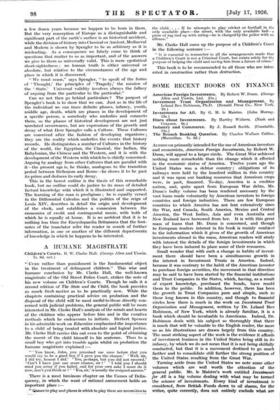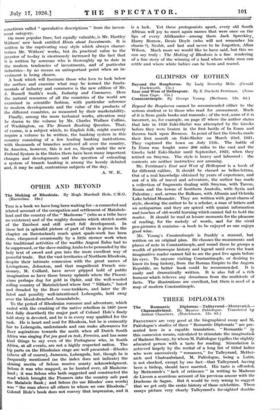SOME RECENT BOOKS ON FINANCE
ALTHOUGH primarily intended for the use of American investors and economists, American Foreign Investments, by Robert W. Dunn, will appeal to a larger circle. The Great War achieved nothing more remarkable than the change which it effected in the economic status of America. Twelve years ago the United States was a debtor country ; obligations of its railways were held by the hundred million in this country and it was upon our banking resources that American crops were, in part, financed. To-day, America is a creditor nation, and, quite apart from European War debts, Mr. Dunn's bulky volume has been rendered necessary by the vast loans made voluntarily by American investors to foreign countries and foreign industries. There are few European countries to which America has not lent extensively since the War, and Canada, South America, Mexico and Central America, the West Indies, Asia and even Australia and New Zealand have borrowed from her. It is with this great mass of loans that Mr. Dunn is concerned, and though to European readers interest in his book is mainly confined to the information which it gives of the growth of American investments abroad in the mass, American readers will study with interest the details of the foreign investments in which they have been induced to place some of their resources.
Small wonder that with such a change in habits of invest- ment there should have been a simultaneous growth in the interest in Investment Trusts in America. Indeed, because it was contrary to the habit of the American investor to purchase foreign securities, the movement in that direction may be said to have been started by the financial institutions and Trust Companies in the States, which, having, as a result of expert knowledge, purchased the bonds, have resold them to the public. In addition, however, there has been the growth in Trust Companies pure and simple, such as those long known in this country, and though to financial circles here there is much in the work on Investment Trust Organization and Management, written by Dr. Leland Rex Robinson, of New York, which is already familiar, it is a book which should be invaluable to Americans. Indeed, Dr. Robinson deals with his subject so thoroughly that there is much that will be valuable to the English reader, the more so as his illustrations are drawn largely from this country. The most striking aspect of the work is the evidence it affords of investment business in the United States being still in its infancy, by which we do not mean that it is not being skilfully conducted, but that it is a movement destined to go much farther and to consolidate still further the strong position of the United States resulting- from the Great War.
Turning aside from the United States we note some other volumes which are well worth the attention of the general public. Mr. le Maistre's work entitled Investments far AU is a big volume dealing with what may be termed the science of investments. Every kind of investment is considered, from British Funds down to oil shares, for the writer, quite correctly, does not entirely exclude what are
sometimes called " speculative descriptions " from the invest- ment category.
On more popular lines, but equally valuable, is Mr. Hartley Withers' new book entitled Hints about Investments. It is written in the captivating easy style which always charac- terizes Mr. Withers' works, but its practical value to the investor of to-day is enormously increased by the fact that it is written by someone who is thoroughly up to date in the modern tendencies of investments, and of particular industries—by no means an unimportant point when an in- vestment is being chosen.
A book which will fascinate those who love to look below the surface and examine what may be termed the funda- mentals of industry and commerce is the new edition of Mr. J. Russell Smith's work, Industry and Commerce. Here the natural resources of all the countries of the world are examined in scientific fashion, with particular reference to modern developments and the value of the products of the different countries, as measured by their marketability.
Finally, among the more technical works, attention may be drawn to the volume by Mr. Charles Wallace Collins, of Washington, on The Branch Banking Question. That, of course, is a subject which, to English folk, might scarcely require a volume to be written, the banking system in this country consisting of a few leading banking institutions, with thousands of branches scattered all over the country. In America, however, this is not so, though under the new Federal System in the States there have been many important changes and developments and the question of extending a system of branch banking is among the keenly debated and, it may be said, contentious subjects of the day.
A. W. K.











































 Previous page
Previous page